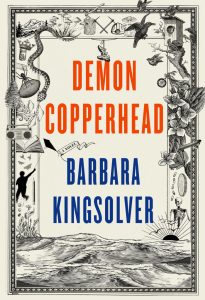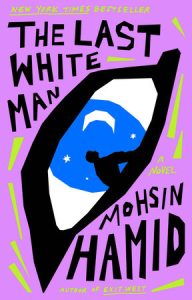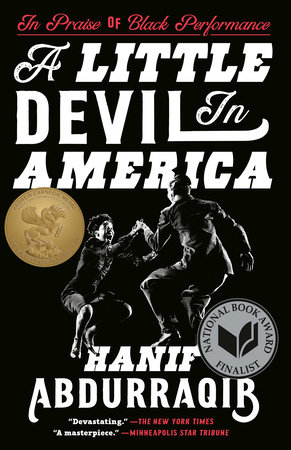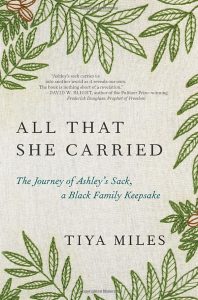Prepare yourself, for the third wave of your librarians’ book recommendations is upon you!
If you missed our previous editions, make sure to check them out here and here.
Let’s get into it!
Fiction:
Our first recommendation comes from Joanne Helouvry (Social Sciences). The book is Demon Copperhead, by Barbara Kingsolver. Available from the Sheridan Libraries!
Demon Copperhead is set in the mountains of southern Appalachia. It’s the story of a boy born to a teenaged single mother in a single-wide trailer, with no assets beyond his dead father’s good looks and copper-colored hair, a caustic wit, and a fierce talent for survival. In a plot that never pauses for breath, relayed in his own unsparing voice, he braves the modern perils of foster care, child labor, derelict schools, athletic success, addiction, disastrous loves, and crushing losses. Through all of it, he reckons with his own invisibility in a popular culture where even the superheroes have abandoned rural people in favor of cities.
Many generations ago, Charles Dickens wrote David Copperfield from his experience as a survivor of institutional poverty and its damages to children in his society. Those problems have yet to be solved in ours. Dickens is not a prerequisite for readers of this novel, but he provided its inspiration. In transposing a Victorian epic novel to her own place and time, Barbara Kingsolver enlists Dickens’ anger and compassion, and above all, his faith in the transformative powers of a good story. Demon Copperhead speaks for a new generation of lost boys, and all those born into beautiful, cursed places they can’t imagine leaving behind.
– Barbara Kingsolver
Our next book is Musashi, by Eiji Toshikawa, a classic novel about samurai life. The recommendation comes from Liz Mengel (Associate Dean for Collections and Academic Services). Musashi is available through the Sheridan Libraries!
Miyamoto Musashi was the child of an era when Japan was emerging from decades of civil strife. Lured to the great Battle of Sekigahara in 1600 by the hope of becoming a samurai–without really knowing what it meant–he regains consciousness after the battle to find himself lying defeated, dazed, and wounded among thousands of the dead and dying. On his way home, he commits a rash act, becomes a fugitive, and brings life in his own village to a standstill–until he is captured by a weaponless Zen monk.
The lovely Ots, seeing in Musashi her ideal of manliness, frees him from his tortuous punishment, but he is recaptured and imprisoned. During three years of solitary confinement, he delves into the classics of Japan and China. When he is set free again, he rejects the position of samurai and for the next several years pursues his goal relentlessly, looking neither to left nor to right.
Ever so slowly it dawns on him that following the Way of the Sword is not simply a matter of finding a target for his brute strength. Continually striving to perfect his technique, which leads him to a unique style of fighting with two swords simultaneously, he travels far and wide, challenging fighters of many disciplines, taking nature to be his ultimate and severest teacher and undergoing the rigorous training of those who follow the Way. He is supremely successful in his encounters, but in the Art of War he perceives the way of peaceful and prosperous governance and disciplines himself to be a real human being.
He becomes a reluctant hero to a host of people whose lives he has touched and been touched by. And, inevitably, he has to pit his skill against the naked blade of his greatest rival.
– Amazon
Our next recommendation is The Last White Man by Mohsin Hamid and recommended by Sue Vazakas (Science and Engineering). The Last White Man is available through the Sheridan Libraries!
One morning, a man wakes up to find himself transformed. Overnight, Anders’s skin has turned dark, and the reflection in the mirror seems a stranger to him. At first he shares his secret only with Oona, an old friend turned new lover. Soon, reports of similar events begin to surface. Across the land, people are awakening in new incarnations, uncertain how their neighbors, friends, and family will greet them.Some see the transformations as the long-dreaded overturning of the established order that must be resisted to a bitter end. In many, like Anders’s father and Oona’s mother, a sense of profound loss and unease wars with profound love. As the bond between Anders and Oona deepens, change takes on a different shading: a chance at a kind of rebirth–an opportunity to see ourselves, face to face, anew.
– Penguin Random House
We’re breaking the format this week and recommending four fiction titles. It is summer after all. Our last fiction suggestion this time is The House in the Cerulean Sea by TJ Klune, recommended by Susan Payne (Head of Assessment and User Experience). This book is available through the Enoch Pratt Free Library in various formats.
Linus Baker is a by-the-book case worker in the Department in Charge of Magical Youth. He’s tasked with determining whether six dangerous magical children are likely to bring about the end of the world.
Arthur Parnassus is the master of the orphanage. He would do anything to keep the children safe, even if it means the world will burn. And his secrets will come to light.
– Macmillan Books
Since we gave you an extra fiction recommendation this week, we’re going to skimp a little in the non-fiction section. We don’t want to overwhelm you.
Our first non-fiction title is A Little Devil in America by Hanif Abdurraqib, recommended by Sian Evans (Online Programs and Women, Gender, & Sexuality). It’s available through the Enoch Pratt Library in various formats.
“I was a devil in other countries, and I was a little devil in America, too.” Inspired by these few words, spoken by Josephine Baker at the 1963 March on Washington, MacArthur “Genius Grant” Fellow and bestselling author Hanif Abdurraqib has written a profound and lasting reflection on how Black performance is inextricably woven into the fabric of American culture. Each moment in every performance he examines—whether it’s the twenty-seven seconds in “Gimme Shelter” in which Merry Clayton wails the words “rape, murder,” a schoolyard fistfight, a dance marathon, or the instant in a game of spades right after the cards are dealt—has layers of resonance in Black and white cultures, the politics of American empire, and Abdurraqib’s own personal history of love, grief, and performance.
Touching on Michael Jackson, Patti LaBelle, Billy Dee Williams, the Wu-Tan Clan, Dave Chappelle, and more, Abdurraqib writes prose brimming with jubilation and pain. With care and generosity, he explains the poignancy of performances big and small, each one feeling intensely familiar and vital, both timeless and desperately urgent. Filled with sharp insight, humor, and heart, “A Little Devil in America” exalts the Black performance that unfolds in specific moments in time and space—from midcentury Paris to the moon, and back down again to a cramped living room in Columbus, Ohio.
– Penguin Random House
And putting a bow on this edition is a recommendation from our Hopkins Retrospective Program Manager, Allison Seyler, All that She Carried by Tiya Miles. All That She Carried is available at the Sheridan Libraries!
In a display case in the Smithsonian’s National Museum of African American History and Culture sits a rough cotton bag, called *Ashley’s Sack,* embroidered with just a handful of words that evoke a sweeping family story of loss and of love, passed down through generations.
In 1850s South Carolina, an enslaved woman named Rose gave this sack filled with a few precious items to her daughter, Ashley, as a token of love and to try to ensure Ashley’s survival as well. Soon after, the nine-year-old girl was separated from her mother and sold.
Decades later, Ashley’s granddaughter Ruth embroidered this family history on the bag in spare yet haunting language—including Rose’s wish that “It be filled with my Love always.” Now, in this illuminating, deeply moving book inspired by Rose’s gift to Ashley, historian Tiya Miles carefully unearths these women’s faint presence in archival records to follow the paths of their lives—and the lives of so many women like them—to write a singular and revelatory history of the experience of slavery, and the uncertain freedom afterward, in the United States.
The search to uncover this history is part of the story itself. For where the historical record falls short of capturing Rose’s, Ashley’s, and Ruth’s full lives, Miles turns to objects and to art as equally important sources, assembling a chorus of women’s and families’ stories and critiquing the scant archives that for decades have overlooked so many. As she follows Ashley’s journey, Miles metaphorically “unpacks” the sack, deepening its emotional resonance and exploring the meanings and significance of everything it contained. The contents of Ashley’s sack—a tattered dress, handfuls of pecans, a braid of hair, “my Love always”—are eloquent evidence of the lives these women lived. They open up a window on Rose and Ashley’s world.
– Tiya Miles






